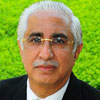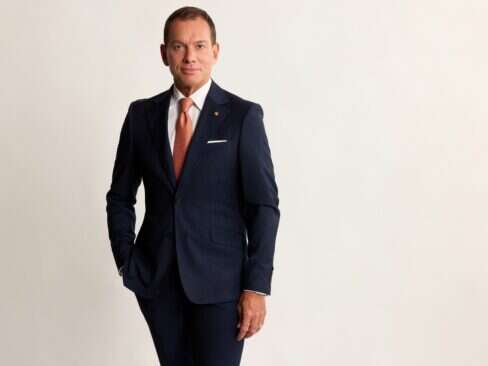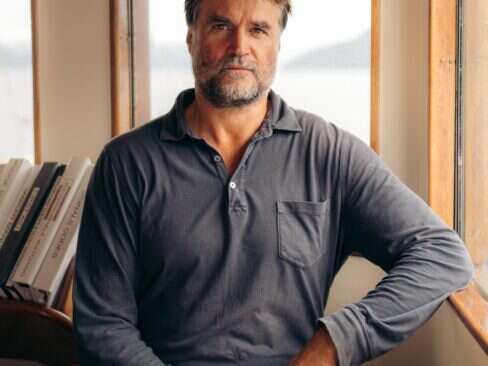
Director on the BoardITC
Nakul Anand was appointed a Director on the Board of ITC in January 2011 and is responsible for the hospitality, travel and tourism businesses of ITC. An Economics Honours graduate from Delhi University with an AMP degree from Bond University in Australia, he joined ITC Hotels’ Management Training Program in 1978 and also served as the Managing Director of ITC Hotels Limited since 2003. In a career that spans over three decades, he has been acknowledged for his vision and commitment. Recently Elite Traveler Editor-in-Chief Douglas Gollan took the green route to ITC’s hotel division headquarters in the Gujaron business district of Delhi where he enjoyed a lights-out experience and lunch from the group’s future star chefs.
ET: Tell us about ITC?
Nakul Anand: ITC is more than 100 years old and started under the name Imperial Tobacco Company of India. As the Company’s ownership progressively Indianised, the name of the Company was changed from Imperial Tobacco Company of India to India Tobacco Company in 1970 and then to I.T.C. in 1974. The company’s multi-business portfolio encompasses more than 50 companies in cigarettes & tobacco, hotels, information technology, packaging, paperboards and specialty papers, agri-business, foods, lifestyle retailing, education and stationery and personal care. The full stops in the Company’s name were removed in 2001 and became ITC Limited. We are publicly traded and our market cap is over $30 billion.
ET: What is the structure of ITC?
Nakul Anand: ITC is a board-managed professional company, committed to creating value for the shareholder and for the nation. We have an organizational culture rooted in its core values of respect for people and belief in empowerment. Its philosophy of all-around value creation is backed by strong corporate governance policies and systems. Our strategies include developing a portfolio of world class businesses that best matches organizational capability with opportunities in domestic and export markets. We benchmark the health of each business comprehensively across the criteria of market standing, profitability and internal vitality. We ensure that each of its businesses is world class and internationally competitive. We enhance the competitive power of the portfolio through synergies derived by blending the diverse skills and capabilities residing in ITC’s various businesses, and create distributed leadership within the organization by nurturing talented and focused top management teams for each of the businesses.
ET: What about the Hotels Division?
Nakul Anand: In India, One million rupees gives 80 jobs in the hotel business – it is the largest multiplier and it doesn’t have to be a skilled position. We are in three segments – luxury, full service mid scale and welcome heritage – old homes and palaces. We were a latecomer to the hotel business starting in 1975. We grew, then were stagnant and in the early 90s we grew again. In 1975 the company launched its hotels business with the acquisition of a hotel in Chennai renamed ITC-Welcomgroup Hotel Chola. The objective of ITC’s entry into the hotels business was rooted in the concept of creating value for the nation. ITC chose the hotels business for its potential to earn foreign exchange, create tourism infrastructure and generate large scale direct and indirect employment. Since then ITC’s Hotels business has grown to occupy a position of leadership, with over 100 owned and managed properties spread across India and now a project in Sri Lanka.
ET: Can you give us some examples of synergy between the different divisions?
Nakul Anand: Each of our businesses has multiple synergies with other business. There was always the debate about sticking to our knitting. Should we divest and focus on a single area or should we diversify. ITC took the path less traveled. We focused and diversified. For example our chefs from our hotels give recipes to our consumer business that makes potato products that gets potatoes from our agribusiness. We took computers into villages and provided information and knowledge so farmers could grow more. There is a method to this madness.
ET: Tell us about ITC’s philosophy on the environment?
Nakul Anand: We are in the highest rated LEED platinum building in the world (ITC Green Centre, headquarters for the ITC Hotels Division) – scoring 98 out of 100. It’s a higher score than the LEED Platinum headquarters. Sometime two years back we were at the crossroads. We all sat down and debated. There was the idea for guests to reduce air conditioning, sleep at 24 degrees, not eat smoked salmon. The options were either sustainable or luxury. We decided to choose a third, responsible luxury. Low water pressure and putting signs for guests to rescue towels is nickels and dimes – its 1 or 2 percent. We decided we do the 98 percent so you have guilt free indulgence. It means we invested in green generators and compressors. We generate on our own about 25 percent of the electricity we use in our luxury hotels. We wanted guests to have guilt free indulgence.
ET: But lots of hotels promote that they are environmentally friendly?
Nakul Anand: We see lots of hotels where it is all about press releases, green-washing consumers – we didn’t want to be seen as green washing. For us, it is a corporate philosophy – it is a story of differentiation. All 10 of our luxury hotels are LEED Platinum certified.
ET: Are there any areas where guests participate in the savings?
Nakul Anand: Room service is a great example of guilt free indulgence. In the 1980s and 1990s, the demand for room service went down. Then with internet and email it has come back as guests want to catch up at the end of the day. Room service creates lots of dishes that need to be washed and lots of wasted food. It also takes time to set up the carts with all the plates and then there is time taken from the guest while they wait for the cart to be set-up interrupting their work time. We introduced Welcome Meals from our room service menu. Guest can combine four one quarter portions of four items from the menu – all the variety at the same cost – less food waste, less dishes to wash and quicker service, so a customer benefit.
ET: Food seems to be an important part of the ITC experience?
Nakul Anand: We have 30 chefs researching Indian cuisine. We have won the ‘Golden Fork Award’ from the International Food and Wine Writers Guild for Bukhara and Dum Pukht restaurants at ITC Maurya. Bukhara at ITC Maurya in New Delhi won Best Indian Restaurant in the world by ‘The Restaurant Magazine’, UK. It has been voted the Best Restaurant in Asia and is the only Indian restaurant to feature in the list of 50 Best Restaurants in the World for five years since 2002. ITC Maurya has won Awards for the Best North Indian (DumPukht) and the Best Whisky Bar (Golf Bar) in India. Icons of Whisky, the most prestigious Whisky Awards in the World was launched in India for the first time at ITC Maurya in the year 2008. We offer Indian food in unique ways. It is part of the experience we offer.
ET: How about technology?
Nakul Anand: At ITC Grand Chola in Chennai there are iPads in every room with every kind of feature, from control room lights and air conditioning, television, room service with pictures, laundry. It even let’s you see whose at the door and unlock it. At the same time we also have a paper menu and traditional switches. We won’t loose the human touch. If you want to call to order your room service, you can, or you can use the iPad– both are available.
ET: Are there any other features using technology?
Nakul Anand: From a luxury point of view, anti stumble – the first thing people want is a good night’s sleep. We sell sleep before everything else. When you get up in the middle of the night, everything is blacked out. We have anti-stumble lighting – you put your foot down and a zone puts a floor light on, and as you move one floor light goes out and the next goes on so you don’t disturb your partner.
ET: What about expansion?
Nakul Anand: Our chairman made an announcement that we will invest $2 billion in hotels – owned hotels and management. We are driven by opportunity more than strategy.
We had a good opportunity in Sri Lanka – beachfront. We are not opposed to going abroad but there are incredible opportunities here in India. ITC Grand Chola, Chennai is our 10th luxury property and is a palatial tribute to Southern India’s greatest empires – the Imperial Cholas. It has 522 rooms and 78 luxuriously serviced apartments. The aesthetics of the Cholas, an ancient dynasty that made a deep impact on many regions within and outside of this country. We brought in one million square feet of marble – an entire quarry – and employed 4,000 artisans to carve the marble. Close to here we will have the ITC Hotel at the Classic Golf Resort at Manesar. It will have a 27 hole Jack Nicklaus Signature Golf Course with residential villas, conference facilities and a wellness center, plus a polo field. It will attract high-end tourism, incentives and Heads of State conferences.
ET: What about the domestic market?
Nakul Anand: We have 700 million domestic travelers in India compared to 6 million international – many stay with family and friends but these people are now moving towards wanting hotels. There is endless opportunity right here.
ET: How are you preparing to staff your growing portfolio?
Nakul Anand: The key is software – people – we have a large management training institute – hotel school. ITC Management Hotel Institute has 200 trainees from chefs to general management to housekeeping. The lunch we are having today was prepared by trainees (Editor’s Note – It was very good!).
ET: And you almost pursued a career in music?
Nakul Anand: I love my music – I was a deejay. Today it’s a science not an art – when I was a deejay there was skill to change two LPs while making sure the dancing never stopped. And hospitality wasn’t well received by my family. My grandmother didn’t think the service business was good. India’s day has come, and hospitality is an important industry here. We have world-class airports, new infrastructure, new businesses and we are ready.
















